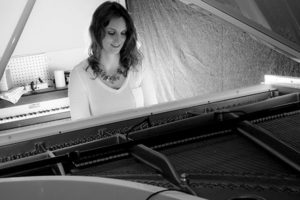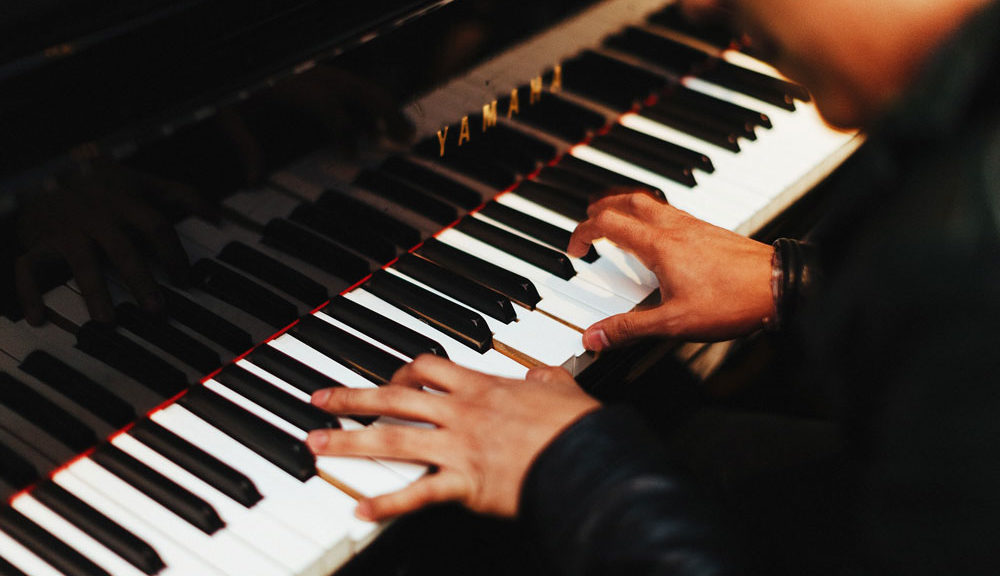
10 Reasons It’s Better to Take Piano Lessons than Teach Yourself
To some, the phrase “self-taught musician” seems to carry bragging rights. However, what self-taught pianists say about themselves tells a different tale.
A simple Google search for “piano lessons or self-taught” brings up web forum after web forum on the subject. The conclusion repeats itself: self-taught musicianship can is possible, but lessons with the right teacher will generally get it done faster, better, and with greater success. Numerous self-taught pianists lament their poor technique, mistakes in playing of pieces, less firm a grasp on music theory, and the many years spent to overcome these initial missteps.
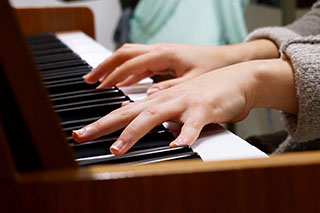 After all, how do you know what you don’t know? You really can’t until after the fact! Hindsight is 20/20 – when a self-taught musician looks back on all the trial-and-error, the hindrances to progress are pretty obvious. However, the right teacher can guide you through the learning process and manage the roadblocks self-taught pianists aren’t aware of until after many years are spent overcoming them.
After all, how do you know what you don’t know? You really can’t until after the fact! Hindsight is 20/20 – when a self-taught musician looks back on all the trial-and-error, the hindrances to progress are pretty obvious. However, the right teacher can guide you through the learning process and manage the roadblocks self-taught pianists aren’t aware of until after many years are spent overcoming them.
The Benefits Provided by a Piano Teacher
The right piano teacher can provide…
1. Assurance of a Complete Education
A complete piano education will cover the following areas:
- Reading music:
- Learning to recognize notes both ABSOLUTELY (alone on the staff) and RELATIVELY (in reference to other notes) is an essential part of reading music.
- Fingering:
- Which fingers you use to play can be expressed as they are PRINTED (you are directly told what to use), as IMPLIED (“filling in the blanks”so to speak, through experience and practice) and PERSONALLY (after hours and years of playing with proper technique, you will develop a reflexive preference)
- Theory:
- Music theory is more than just reading notes and time signatures. You should learn chord progressions, modes, how to consider other instruments composition-wise relative to the piano. Even some teachers will not cover this material appropriately. Theory should also be taught in a practical sense, applied directly to the music rather than just in a workbook.
- Technique:
- Proper technique is necessary to develop pain-free, expressive playing.
- Ear Training:
- Again, playing music is much more than reading notes on a page. Playing music is as much about LISTENING as it is DOING, in order to express yourself through the instrument. Some of this happens automatically, depending on your natural ability – but everyone has more hidden aptitude that can be coached out through ear training. A great teacher can identify what you can listen for in order to enhance your learning and playing.
- Composition:
- Even if you don’t dream of composing your own music, working that creative muscle a bit will help you be a better player – whether as a pianist, multi-instrumentalist or singer. And who knows, you may discover hidden passion for songwriting that wouldn’t have revealed itself without some prompting by your first teacher. Those first attempts may spark a future fire for this kind of expression.
- History:
- Music history is more important than may think for a beginning student. The biographies of various musicians or bands, whether your genre or not, can be quite inspirational. Learning about the other interests and life paths of these musicians can give you insight into making your own success.
- Genres:
- A complete music education will expose you to music across different time periods, cultures and modern styles. If you don’t try it, how will you know whether or not you like it? You may surprise yourself. Even playing something you don’t like can help you find what you do like.
2. Accurate Information
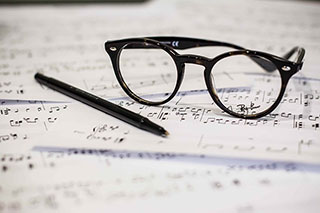 As a musician who has played with both self-taught and formally educated musicians, I can attest to the value of accurate information. While it is certainly possible to find accurate information to teach yourself, experience tells me that doesn’t happen most of the time. You’ll certainly have better luck if you learn from a trusted method series (for example, Bastien, Alfred, Faber, Mel Bay, Schaum) but the there is quite a bit of incorrect information on the internet.
As a musician who has played with both self-taught and formally educated musicians, I can attest to the value of accurate information. While it is certainly possible to find accurate information to teach yourself, experience tells me that doesn’t happen most of the time. You’ll certainly have better luck if you learn from a trusted method series (for example, Bastien, Alfred, Faber, Mel Bay, Schaum) but the there is quite a bit of incorrect information on the internet.
As a beginner, it may not be clear to you how inaccurate information may exist. However if you continue to pursue music throughout your life and play with others, it will become evident! Communication and collaboration go much more smoothly when everyone shares correct knowledge (or you know enough to lead other musicians who are lacking the knowledge).
3. Corrections to Wrong Notes or Rhythms
When you teach yourself piano, you are relying on yourself to recognize your mistakes. Think back to when you began to read as a child. If no one was there to hear you read aloud, to show you could pronounce and understand the words, how would that have turned out? It’s the blind leading the blind. You could make mistakes for months and years and with no one there to correct you, and you many not find out until much later. This should be important to you if you wish to play with skill and accuracy.
4. Enforcement of Proper Technique
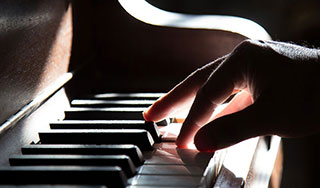 Good technique is essential to playing music at your full potential. This ranges from fingering and how to play expressively (meaningful execution of staccato, legato, ritardando, dynamics, etc.) to good posture at the piano and how to move your fingers/hands/arms/body to avoid injury. The better your technique, the better you will sound and the more you and others will connect with the music. In the language of music, technique is pronunciation and inflection of your voice.
Good technique is essential to playing music at your full potential. This ranges from fingering and how to play expressively (meaningful execution of staccato, legato, ritardando, dynamics, etc.) to good posture at the piano and how to move your fingers/hands/arms/body to avoid injury. The better your technique, the better you will sound and the more you and others will connect with the music. In the language of music, technique is pronunciation and inflection of your voice.
5. Coaching for Success and Discipline
While making corrections to your technique and what you’re playing, a piano teacher can also provide the discipline to make those corrections. Ideally, your teacher will approach this from a position of encouragement perspective rather than that of a totalitarian dictator. This way, you can begin to develop your own self-discipline. Then, when you are eventually no longer taking lessons, you can teach yourself any song because you have learned to hold yourself accountable.
6. Appropriate Pace of Development
 If you are teaching yourself, how will you decide what to practice and when to move on? There are numerous components in a complete music education (see point #1 above), so how will you know which topic is most important to focus on at a given moment? Should you focus most on rhythm and tempo? Or should you focus more on notes first? Should you “focus” on everything and only move on when a piece is perfect? (hint: I advise against the last option – it may cause you hate piano and quit!)
If you are teaching yourself, how will you decide what to practice and when to move on? There are numerous components in a complete music education (see point #1 above), so how will you know which topic is most important to focus on at a given moment? Should you focus most on rhythm and tempo? Or should you focus more on notes first? Should you “focus” on everything and only move on when a piece is perfect? (hint: I advise against the last option – it may cause you hate piano and quit!)
A great teacher is in tune with his or her student, balancing a number of factors that influence the student’s success. Is the student frustrated or bored? Is what is causing frustration or boredom important right now? Do we need to drive a point home in this song or lesson or is it something that will come with time? If we ignore an issue will it just continue to get worse? The right piano teacher will know when and where to push so the student can reach his or her full potential.
7. Dedicated Time to Focus and Check In
If you’re not so good with the self-discipline, the deadline of a weekly lesson is a great motivator. At first, you may be surprised how quickly a week passes – and how easy it was to forget to practice. Or maybe you’ve been avoiding practice and your teacher can help sort out why and solve the problem. Boredom, frustration, being overwhelmed by the volume of work, or pain are all issues that can be identified and solved with the help of the right teacher.
8. The Right Piano Method
 If you’re using an established, trusted piano method, you’re guaranteed accurate information. However, what you aren’t guaranteed is the right fit. The pace of the method, quality and or difficulty of arrangements, and teaching style of the program are all of concern. Some methods, such as those focused on learning through memorization (Suzuki) may actually be detrimental to your future ability to read and therefore play music. A teacher who is familiar with a variety of methods will be able to help you find the right method for you and your goals.
If you’re using an established, trusted piano method, you’re guaranteed accurate information. However, what you aren’t guaranteed is the right fit. The pace of the method, quality and or difficulty of arrangements, and teaching style of the program are all of concern. Some methods, such as those focused on learning through memorization (Suzuki) may actually be detrimental to your future ability to read and therefore play music. A teacher who is familiar with a variety of methods will be able to help you find the right method for you and your goals.
9. Supplemental Material
The method provides the basics, however, unless you are fully entertained by learning to play songs like “On Top of Old Smoky” or “Aura Lee” then you probably have some other songs or styles you’d like to learn. The old, familiar tunes and specially written exercises in method books are valuable to train your hands for technique and your eyes for reading – but supplemental material will allow you to apply these skills to something you want to do.
Additionally, supplemental material is valuable for improving areas where you are weak and perhaps the method doesn’t cover so well. A great teacher will be able to find the right supplemental materials to engage you and make you a more effective pianist.
10. Facts vs. Myths
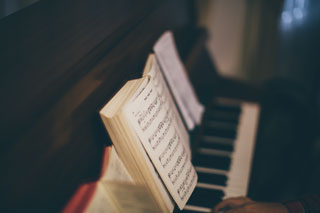 A teacher will help you wade through the facts and the myths about piano that are so plentiful on the internet and among self-taught musicians. There really are too many to list but pianist Howard Richman does a great job explaining many of them here.
A teacher will help you wade through the facts and the myths about piano that are so plentiful on the internet and among self-taught musicians. There really are too many to list but pianist Howard Richman does a great job explaining many of them here.
Passion, Perseverance, Practice, Perpetual Effort
To play the piano well, it takes many years at the keys. This kind of effort can only be sustained through a true enjoyment of the instrument. It requires what I call the Four P’s of Piano: passion, perseverance, practice and perpetual effort. Frustration from incorrect information or bad technique, boredom from the wrong pace, and a lack of discipline can derail your dreams of learning to play the piano.
Piano lessons will give you the best return on the time you invest to learn the instrument. With the right teacher, you can work on what interests you, learn at a comfortable pace while continuing to develop effectively, receive encouragement and coaching that invigorates you, and learn accurate theory and technique.
Related Articles Recommended for You

Read More

Read More

Read More

Read More

Read More

Read More

Read More

Read More

Read More

Read More
